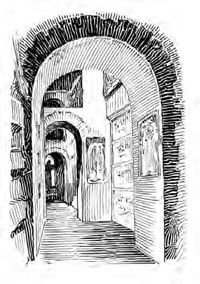Check out Putting a Bullet in Descriptive Text from Charles Ryan.
It closely matches how I prep descriptive text for my own sessions. And, as you can see in Complex of Zombies, I actually push this philosophy even further: Every aspect of an encounter area is keyed as a clearly titled and easily identifiable “chunk” that allows you to instantly grasp the entirety of even the most complex areas in a single glance.
I’ve been thinking about writing a longer essay of my own on this topic for awhile, and I probably still will at some point. But, in the mean time, check out Ryan’s piece.
Filed under: Roleplaying Games | Comments (2)
Over on Lamentations of the Flame Princess, Mr. Raggi wrote a really good piece on Toybox Style Play.
Check it out.
Basically, he’s talking about a principle of design in which you include elements which (a) aren’t designed to be interacted with mechanically and (b) don’t actually have any pre-designed purpose (or, at least, no “meaningful” one).
In other words, make it a point to include randomly cool shit in your adventures.
I really couldn’t agree more strongly with this. My 101 Curious Items are an example of this. Similarly, whenever I’m keying a room, I’ll try to make it a point to include at least one detail that is interesting-but-irrelevant. These aren’t always things that the PCs can interact with, but they frequently are. (For example, in one “empty” room I littered the floor with shards of shattered pottery… which could be reassembled with a mend spell to reveal several crude busts. In another case I put “age-old scratches” on a door. )
If you’ve been reading the Alexandrian for awhile, you know that I make it a very specific point to design scenarios in which I really have no idea what the outcome will be. I want to be surprised by the actions of my players and to be just as surprised by what happens in play as they are. Stuff like Don’t Prep Plots and Node-Based Scenario Design describe some of the ways I achieve that at a macro-level. But this “toybox” design is one of the ways I exercise the same principle on the micro-scale: If you include enough randomly cool shit, eventually the players are going to grab onto it and do something ridiculously cool with it.
Filed under: Roleplaying Games | Comments (6)

Speaking of the virtues of strategic gaming, the Humble Bundle program is offering up a suite of Introversion games including Uplink, which is one of the most immersive computer games ever made (and which achieves that immersion by anachronistically eliminating save games and enforcing real-time strategy-based play).
For those unfamiliar with the Humble Bundle program, they put together packages of indie games which you can then buy by naming your own price. Not only can you name your own price, but a chunk of the money you pay is donated to charity. (And you get to specify exactly how much goes to charity and how much goes to the game designers.)
For those unfamiliar with Uplink, you assume the role of a computer hacker accepting jobs from anonymous clients to break into data systems around the globe. And when I say “assume the role”, I really mean it: The game takes the form of a client interface. The actual hacking is takes the form of fictional “awesome hacking”, but everything about the experience makes it feel like something you’re really doing and not just playing.
In addition to the extraordinary Uplink, the bundle also includes Defcon, Darwinia, Multiwinia, Crayon Physics, and Aquaria. (The last two games are bonuses and were not designed by Introversion.) Really, you can’t go wrong here. (Particularly since you can name your own price.)
Check it out.
Filed under: Random, Video Games | Comment (0)
Aeons & Auguries has put together a pretty fantastic series of dungeon stocking tables. You can find the master table here and then click through to the sub-tables.
There are some great imagination churners in there.

Filed under: Roleplaying Games | Comment (1)
Over on Hack & Slash, -C has written an interesting trio of posts on the matter of the Quantum Ogre:
On Quantum Ogres
On Slaying Quantum Ogres
On Resurrecting Quantum Ogre
If you enjoy some of the theoretical stuff I post around this neck of the woods, you’ll probably enjoy this stuff, too.
With that being said, however, I pretty strongly disagree with some of his advice. An addendum I’d like to point out: Players making a choice without having relevant information is only a problem if they don’t have the ability to gain that information. The choice to not get that information is a meaningful choice. (Or the failure to do so is a meaningful consequence.)
So any time he recommends giving players access to information that their characters don’t actually have access to, you can just imagine me shaking my head sadly. That technique is killing player agency just as dead as the quantum ogre is.
Filed under: Random, Roleplaying Games | Comments (2)













